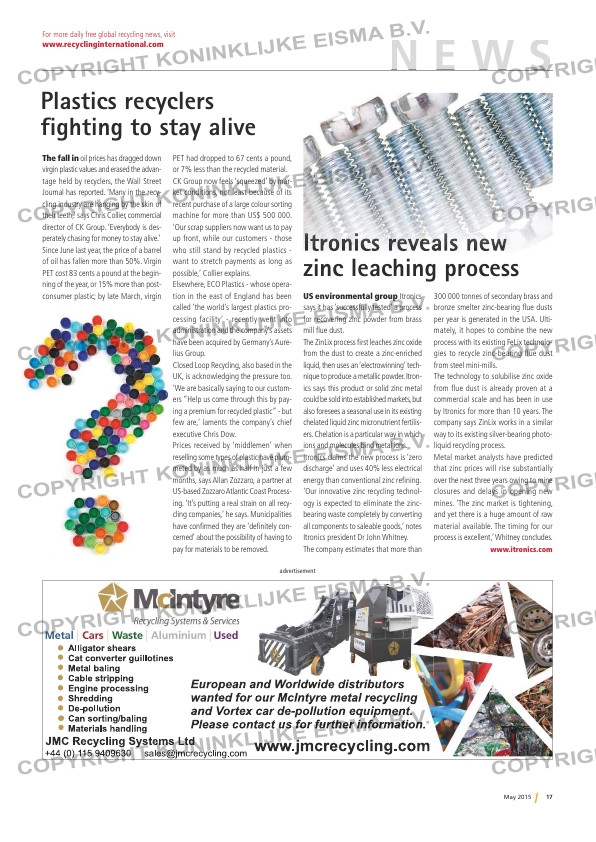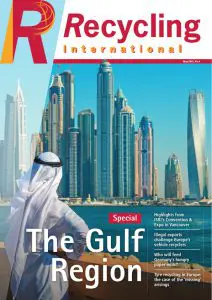Page 17 from: May 2015

N E W S
17May 2015
For more daily free global recycling news, visit
www.recyclinginternational.com
Plastics recyclers
fighting to stay alive
The fall in oil prices has dragged down
virgin plastic values and erased the advan-
tage held by recyclers, the Wall Street
Journal has reported. ‘Many in the recy-
cling industry are hanging by the skin of
their teeth,’ says Chris Collier, commercial
director of CK Group. ‘Everybody is des-
perately chasing for money to stay alive.’
Since June last year, the price of a barrel
of oil has fallen more than 50%. Virgin
PET cost 83 cents a pound at the begin-
ning of the year, or 15% more than post-
consumer plastic; by late March, virgin
PET had dropped to 67 cents a pound,
or 7% less than the recycled material.
CK Group now feels ‘squeezed’ by mar-
ket conditions, not least because of its
recent purchase of a large colour sorting
machine for more than US$ 500 000.
‘Our scrap suppliers now want us to pay
up front, while our customers – those
who still stand by recycled plastics –
want to stretch payments as long as
possible,’ Collier explains.
Elsewhere, ECO Plastics – whose opera-
tion in the east of England has been
called ‘the world’s largest plastics pro-
cessing facility’ – recently went into
administration and the company’s assets
have been acquired by Germany’s Aure-
lius Group.
Closed Loop Recycling, also based in the
UK, is acknowledging the pressure too.
‘We are basically saying to our custom-
ers “Help us come through this by pay-
ing a premium for recycled plastic” – but
few are,’ laments the company’s chief
executive Chris Dow.
Prices received by ‘middlemen’ when
reselling some types of plastic have plum-
meted by as much as half in just a few
months, says Allan Zozzaro, a partner at
US-based Zozzaro Atlantic Coast Process-
ing. ‘It’s putting a real strain on all recy-
cling companies,’ he says. Municipalities
have confi rmed they are ‘defi nitely con-
cerned’ about the possibility of having to
pay for materials to be removed.
US environmental group Itronics
says it has ‘successfully tested’ a process
for recovering zinc powder from brass
mill fl ue dust.
The ZinLix process fi rst leaches zinc oxide
from the dust to create a zinc-enriched
liquid, then uses an ‘electrowinning’ tech-
nique to produce a metallic powder. Itron-
ics says this product or solid zinc metal
could be sold into established markets, but
also foresees a seasonal use in its existing
chelated liquid zinc micronutrient fertilis-
ers. Chelation is a particular way in which
ions and molecules bind metal ions.
Itronics claims the new process is ‘zero
discharge’ and uses 40% less electrical
energy than conventional zinc refi ning.
‘Our innovative zinc recycling technol-
ogy is expected to eliminate the zinc-
bearing waste completely by converting
all components to saleable goods,’ notes
Itronics president Dr John Whitney.
The company estimates that more than
300 000 tonnes of secondary brass and
bronze smelter zinc-bearing fl ue dusts
per year is generated in the USA. Ulti-
mately, it hopes to combine the new
process with its existing FeLix technolo-
gies to recycle zinc-bearing fl ue dust
from steel mini-mills.
The technology to solubilise zinc oxide
from fl ue dust is already proven at a
commercial scale and has been in use
by Itronics for more than 10 years. The
company says ZinLix works in a similar
way to its existing silver-bearing photo-
liquid recycling process.
Metal market analysts have predicted
that zinc prices will rise substantially
over the next three years owing to mine
closures and delays in opening new
mines. ‘The zinc market is tightening,
and yet there is a huge amount of raw
material available. The timing for our
process is excellent,’ Whitney concludes.
www.itronics.com
Itronics reveals new
zinc leaching process
advertisement
RI 4-NEWS.indd 17 30-04-15 15:27



